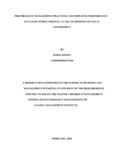| dc.description.abstract | This dissertation presents findings on the relationship between performance management
practices and employee performance in public service in Uganda, using the Ministry of Local
Government Headquarters, Kampala as a case study. The purpose of the study was to examine
the effect of performance management practices on the performance of employees in Ministry of
Local Government Headquarters, Kampala. The study was based on three objectives namely; To
assess the effect of performance planning on employee performance, to examine the effect of
performance monitoring on employee performance, and to investigate the effect of rewards on
employee performance. The study adopted a descriptive cross sectional survey design together
with a blend of qualitative and quantitative approaches which were used to get in-depth results
from directors, Heads of Department, technical and support staff as well as human resource
section of Ministry of Local Government Headquarters. In total, a sample of 137 respondents
participated in the study. In data collection, the researcher used both primary and secondary
sources. Data collection methods were questionnaires, interview guides. Data was analyzed using
Pearson correlation coefficient to determine the relationship between variables. Findings
revealed that performance planning, performance monitoring and rewards have a positive effect
on employee performance. It was concluded that performance monitoring has a stronger effect
on employee performance with Pearson correlation coefficient r=0.825**, and significance of
0.000, followed by performance planning, r=0.488* with a significance of 0.003 and lastly
rewards r=0.466** with a significance value of 0.006. The study recommended that MOLG
should strengthen the framework or tool used for measuring individual performance.
Components such as education and working experience should be considered while measuring
employee performance. The study also recommends that supervisors should give timely feedback
to employees on how they perform. | en_US |

